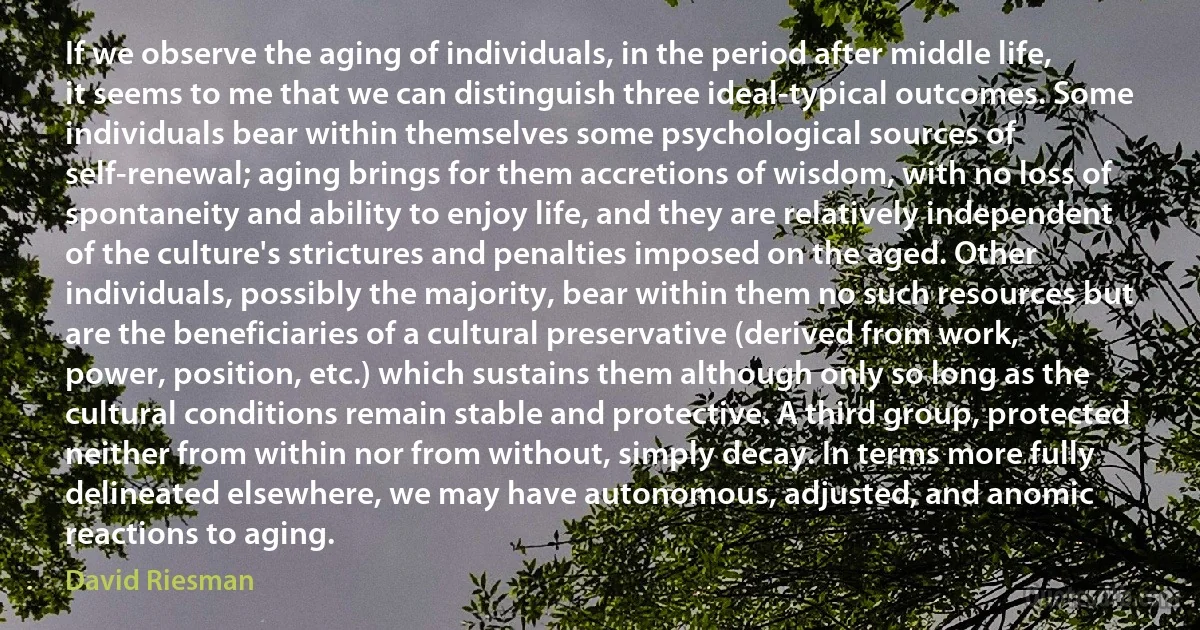
If we observe the aging of individuals, in the period after middle life, it seems to me that we can distinguish three ideal-typical outcomes. Some individuals bear within themselves some psychological sources of self-renewal; aging brings for them accretions of wisdom, with no loss of spontaneity and ability to enjoy life, and they are relatively independent of the culture's strictures and penalties imposed on the aged. Other individuals, possibly the majority, bear within them no such resources but are the beneficiaries of a cultural preservative (derived from work, power, position, etc.) which sustains them although only so long as the cultural conditions remain stable and protective. A third group, protected neither from within nor from without, simply decay. In terms more fully delineated elsewhere, we may have autonomous, adjusted, and anomic reactions to aging.
David RiesmanRelated topics
ability aged aging bear elsewhere life loss middle nor observe position power remain stable third three wisdom work etcRelated quotes
My broad position remains firmly libertarian, sceptical of official cover-ups and uncompromisingly internationalist, believing sovereignty to be an almost total illusion in the modern world, although both expecting and welcoming the continuance of strong differences in national traditions and behaviour. I distrust the deification of the enterprise culture. I think there are more limitations to the wisdom of the market than were dreamt of in Mrs Thatcher's philosophy. I believe that levels of taxation on the prosperous, having been too high for many years (including my own period at the Treasury), are now too low for the provision of decent public services. And I think the privatisation of near monopolies is about as irrelevant as (and sometimes worse than) were the Labour Party's proposals for further nationalisation in the 1970s and early 1980s.

Roy Jenkins
Within a decade, maybe two or three, Christians will come around to treating gays no differently than they now treat other groups whom they previously persecuted - women, Jews, blacks - but not because of some new interpretation of a biblical passage, or because of a new revelation from God. These changes will come about the same way that they always do: by the oppressed minority fighting for the right to be treated equally, and by a few enlightened members of the oppressing majority supporting their cause. Then what will happen is that Christians will take credit for the civil liberation of gays, dig through the historical record and find a few Christian bloggers or preachers who had the courage and the character to stand up for Gay rights when their fellow Christians would not, and then cite those as evidence that were it not for Christianity gays would not be equal.

Michael Shermer
I am neither a saint nor a theologian. To me, good works are more important than theology. We all know that religion has been historically, and still is today, a cause of great evil as well as great good in human affairs. We have seen terrible wars and terrible persecutions conducted in the name of religion. We have also seen large numbers of people inspired by religion to lives of heroic virtue, bringing education and medical care to the poor, helping to abolish slavery and spread peace among nations. Religion amplifies the good and evil tendencies of individual souls. Religion will always remain a powerful force in the history of our species. To me, the meaning of progress in religion is simply this, that as we move from the past to the future the good works inspired by religion should more and more prevail over the evil.

Freeman Dyson
You [ Katherine Sophie Dreier; director of the Art Center in New York City; she co-founded with Duchamp and Man Ray the 'Sociéte Anonyme' in Manhattan in 1920] must understand:
My attitude toward the book is based upon my attitude towards 'Art' since 1918 – so I am furious myself that you will accept only partly that attitude [in a new publication by Katherine Dreier]. It can be no more question of my life as an artist's life: [because] I gave it up ten years ago; this period is long enough to prove that my intention to remain outside of any art manifestation is permanent... The third question is that I want to be alone as much as possible.
This abrupt way to speak of my 'hardening process' is not meant to be mean, but is the result of '42 years of age'....10 000 apologies for this rough letter and affectueusement
Dee.

Marcel Duchamp
There has never been a time, until the last fifty years, when a majority of any population had regular and constant access to drama, and used this access. . . . It seems probable that in societies like Britain and the United States more drama is watched in a week or weekend, by the majority of viewers, than would have been watched in a year or in some cases a lifetime in any previous historical period. It is clearly one of the unique characteristics of advanced industrial societies that drama as an experience is now an intrinsic part of everyday life, at a quantitative level which is so very much greater than any precedent as to seem a fundamental qualitative change. Whatever the social and cultural reasons may finally be, it is clear that watching dramatic simulation of a wide range of experiences is now an essential part of our modern cultural pattern.

Raymond Williams
